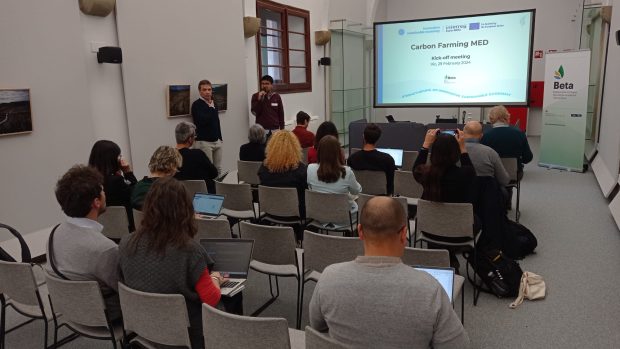Carbon Farming Med, a project to boost the Mediterranean agricultural sector’s entry into the carbon credit market, begins
A new project funded by the Interreg Euro-MED programme which will work to promote the entry of the agricultural sector in the Mediterranean region into the carbon credit market

The launch meeting of Carbon Farming Med, a new project funded by the Interreg Euro-MED programme, which will work to promote the entry of the agricultural sector in the Mediterranean region into the carbon credit market, took place this Thursday in Vic. The project, under the coordination of the UVic-UCC’s BETA Technology Centre, will focus on adapting methodologies for measuring, reporting and verifying the amount of CO2 that can be captured and stored in agricultural soils thanks to the application of certain agricultural and agroforestry practices.
The experience gained in the framework of Carbon Farming Med should serve to demonstrate that the adoption of this type of practices can open the door to the entry of this sector into what is known as “carbon farming”. In broad terms, this is a new business model whereby it would be possible for the agricultural sector to earn additional income from the sale of carbon credits. These credits can be sold as compensation for greenhouse gas emissions, helping to finance and incentivise practices that contribute to climate change mitigation.
To ensure the smooth functioning of the system, it is crucial that verification methods are robust, as it is necessary to ensure the credibility of the carbon credits that are placed on the market. A robust verification system ensures that the amounts of carbon captured and stored are accurately accounted for and that agricultural practices meet the standards set to reduce greenhouse gas emissions.
This is essential to maintain the integrity of the carbon credit market and to ensure that climate change mitigation actions are effective and reliable. In this sense, Carbon Farming Med will be one of the first experiences of its kind in the Mediterranean region. Apart from contributing to the improvement of the conceptual and methodological framework, the consortium will also seek to bring together future beneficiaries of this new market, both buyers and sellers.
Apart from the BETA TC, the consortium also includes the Pyrenees-Mediterranean Euroregion, the European Agroforestry Federation, the company Azolla Projects, the Italian Council for Research in Agriculture and Analysis of Agricultural Economics (CREA), CENER21 from Bosnia and Herzegovina, the Institute for Health and Environment of Slovenia (IHE), the Technical University of Crete and the CRITT IAA South centre from France.
